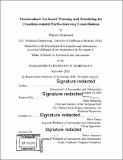Decentralized on-board planning and scheduling for crosslink-enabled Earth-observing constellations
Author(s)
Grunwald, Warren C.
Download1144170553-MIT.pdf (34.45Mb)
Other Contributors
Massachusetts Institute of Technology. Department of Aeronautics and Astronautics.
Advisor
Mark Abramson and Kerri Cahoy.
Terms of use
Metadata
Show full item recordAbstract
Small satellites have improved in capability, nearing a future where high data-rate payloads and crosslinks can provide improved geospatial and temporal coverage, while at a fraction of the cost. Planning and scheduling for efficient bulk data routing with discrete crosslink windows in a dynamic network is a difficult combinatorial optimization problem [30]. As problem size grows, quickly solving the planning and scheduling problem involves implementing algorithms that can leverage parallelization. Decentralized algorithms are inherently parallelizable and can be implemented on-orbit by individual satellites. This thesis investigates a decentralized approach that builds upon the Coupled Constraints Consensus Based Bundle Algorithm (CCBBA) with enhancements to address maximum flow problems. Maximum flow problems occur when moving some resource from sources to sinks across a network, such as a satellite constellation observing targets (sources), moving data between satellites with crosslinks, and down-linking to ground stations (sinks). The CCBBA enhancements include task forking, task outflow coupling, and dynamic task creation based on satellite flow direction preferences. These enhancements increase the total data throughput and decrease required runtime. When implemented on each satellite, this decentralized auction-based approach, named Iterative-CCBBA for Maximum Flow problems (ICMF), provides the following benefits: 1) has robustness in convergence to differences in agent situational awareness, 2) decouples operations from ground station planning resources, and 3) provides an inherently parallelizable algorithm, if implemented on the ground instead of each satellite. ICMF is compared to a state of the art Centralized Global Planner (CGP) in six test cases, with two different inclinations and three different numbers of total satellites. Across all six unique use cases, ICMF has linear scaling in number of consensus rounds and, on average, runs in 94% less time than the CGP, with a 4% improvement in total data volume delivered. ICMF is an effective planner for satellite constellations that value total data throughput and runtime efficiency. The CGP performs better on median latency for observations and median average target age of information, performing better by 58% and 23%, respectively. Future work options for incorporating additional data routing information that could help close the latency and target age of information gap while still using a decentralized approach are presented.
Description
Thesis: S.M., Massachusetts Institute of Technology, Department of Aeronautics and Astronautics, 2019 Cataloged from PDF version of thesis. Includes bibliographical references (pages 151-156).
Date issued
2019Department
Massachusetts Institute of Technology. Department of Aeronautics and AstronauticsPublisher
Massachusetts Institute of Technology
Keywords
Aeronautics and Astronautics.